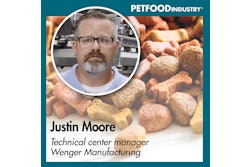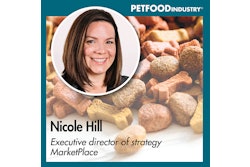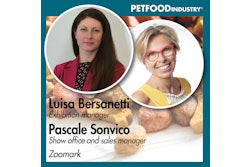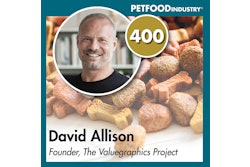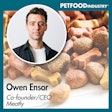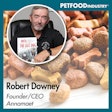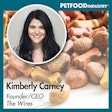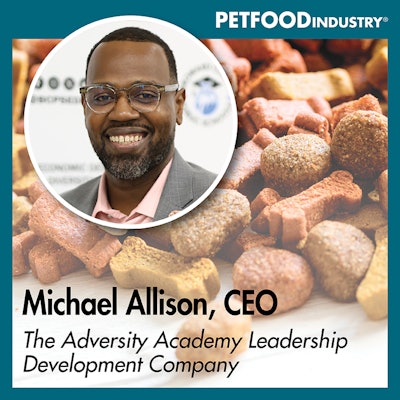
In this episode of Trending: Pet Food, host Lindsay Beaton and Michael Allison, CEO of The Adversity Academy Leadership Development Company, provide a preview of an upcoming "eye opener" session at Petfood Forum 2025. Allison shares actionable advice for those looking to advance their careers without getting in their own way. He emphasizes the importance of taking imperfect actions, setting clear goals, breaking them down into manageable steps, challenging negative thoughts, and seeking support from mentors and accountability partners.
The below transcript is from Episode 80 of the Trending: Pet Food podcast, where host Lindsay Beaton and Michael Allison, CEO of The Adversity Academy Leadership Development Company, try to unlock the secrets to career success – and most importantly, getting out of your own way. You can find the episode at Trending: Pet Food Podcast, on SoundCloud or on your favorite podcast platform. This episode originally aired on February 11, 2025.
We want to thank AFB International for sponsoring this podcast. AFB is the premier supplier of palatants to pet food companies worldwide offering off-the-shelf and custom solutions that make pet food treats and supplements taste great.
Lindsay Beaton, editor, Petfood Industry magazine and host, Trending: Pet Food podcast: Hello, and welcome to Trending: Pet Food, the industry podcast where we cover all the latest hot topics and trends in pet food. I’m your host and editor of Petfood Industry magazine, Lindsay Beaton, and I’m here today with Michael Allison, a U.S. Marine Corps veteran, Purple Heart recipient, leadership expert, and the CEO of The Adversity Academy Leadership Development Company. Hello, Michael, and welcome!
Michael Allison, CEO of The Adversity Academy Leadership Development Company: Thank you so much, Lindsay, for having me here. It's an absolute pleasure.
Beaton: In case you’ve not yet been introduced to Michael or The Adversity Academy, here’s what you need to know.
With over 20-plus years of experience in leadership, Michael has transformed lives and organizations by empowering individuals to embrace adversity, break through limitations, and lead with resilience around the globe. As a globally recognized keynote speaker in the areas of leadership, corporate culture, high-performance teams, and mental wellness, he has delivered transformative presentations at high-level leading organizations and Fortune 500 companies.
Drawing on his experiences alongside senior military leaders, congressional representatives, diplomats, and even the Secretary of State, Michael is driven by a clear mission: to dedicate himself to cultivating a culture of accountability, commitment, and authentic leadership.
The Adversity Academy is a globally renowned leadership training, personal development, and consulting firm. The Academy empowers individuals and organizations by delivering cutting-edge, science-based solutions that simplify leadership challenges and drive transformational growth. From first-time managers to C-suite executives, the company’s mission is to foster resilience, elevate potential, and inspire innovation, ensuring exceptional outcomes for clients.
Michael Allison is the speaker for our Wednesday “eye-opener session” at Petfood Forum 2025, being held at the end of April, where he’ll be presenting Break the Bottle: How to shatter limiting beliefs and achieve peak performance in pet food development and marketing. This, alongside his multifaceted experience in leadership and growth, is why I’ve brought him on today to answer this question: How can we all get out of our own way to succeed in our careers?
Michael, I want to start off with a broader question about how all of this happens, and then we'll get into how we can fix it. Where do you think people most often get in their own way when it comes to their careers?
Allison: I've been in this personal development industry for over 20 years, and it's been amazing ride to watch people become resilient and overcome adversity in their life, their careers and their business and through that experience, I've seen some people overcome so many challenges and fears, so one of the biggest ways people get in their own ways is through self-limiting beliefs.
These beliefs often sound something kind of like, “I'm not good enough, I don't have the right experience, or what if I fail?” These thoughts are rooted in fear, and fear can just be something that paralyzes you when you think about it. For example, if I've worked with an individual who have extraordinary potential, but they hesitate to apply for like leadership roles. They think that they lack specific qualifications.
Through my experience, the research shows that when men apply for jobs, you can see about 60% of them may meet the qualifications, while women will look at it, and 100% of them could have meet the qualifications too, as well. But through some of these disparities, it highlights that self-limiting beliefs are at a disproportionate level where some of the women will not apply these jobs due to these limiting beliefs.
I believe that through these, they stem from a set of either fear, failure or rejection, and that often leads to the things that ties into imposter syndrome, where people feel like they don't deserve to have this level of success. For me, the truth of the matter is that we all have these unique stories and skill sets that are uniquely valuable, that could be an asset to any organizations and an asset to themselves.
I think recognizing some of these self-limiting beliefs might reflect understanding what their true reality is, and that's one of the first steps to overcoming that type of adversity.
Beaton: Now, you mentioned imposter syndrome before I could, because it was going to be the next thing I brought up. It's been my experience that the people who have the strongest imposter syndrome are very often the people who are incredibly qualified and competent at what they do, and could go much further and for whatever reason, are convinced that they're not doing things properly or that they don't have a shot at that promotion.
What is it about those with imposter syndrome that may make that happen? What is going on there? How do you overcome something like that and recognize that, basically, what you're telling yourself is a lie?
Allison: You're so right. So many of us have this limiting belief, the self-imposter syndrome. Oftentimes these people that have imposter syndrome are the most capable, the most intelligent people that could get things accomplished, because they have another level of self-awareness within them. When it comes to that, this is a crucial question, because when you look at some of the internal adversity that we all face, and it's indistinguishable from external challenges, one of the ways that we could assess some of these things to adversity is looking at our behaviors and our outcomes.
What I try to do is look at some things. Do I frequently doubt all my abilities, regardless of external validation? Am I holding myself back from opportunities and asking myself that true question when it comes to self-awareness? Are there challenges that are primarily related to my mindset? Are there challenges related to my external circumstances? Look at some of the challenges that may be affecting me within the workplace that's tied to the culture, some of the resource or limitations, some of those things that's around that, and truly come to an answer when you ask yourself some of those questions.
Beaton: That's a lot of internal work, right? It can be difficult to figure out where to start if that's not part of your typical makeup as a human being. If you have never had the opportunity or any kind of training, if you've never been to therapy, if you've never been to a workplace -- I mean, just the ability to self-reflect and really dive into that, I don't think is something if we have inherently. I feel like it's a learned skill.
Where do you recommend somebody start so they don't get completely overwhelmed with trying to untangle all of that right away?
Allison: You must start doing a self-assessment. That's something we do whenever we're working with clients. We begin by taking them through a self-assessment so we could bring awareness to you. For yourself, if you’re going through those type of limiting beliefs, start writing down what are some things that you’re telling yourself.
Am I telling myself that I'm not good enough? Am I telling myself I am not worthy? Are some of these things that I'm telling myself tied to what someone told me, some of my experiences from a childhood? Start asking, “Is there any truth to this?” If you start identifying some of those things, that's one of the things that will help you get through some of these things.
Many of us look at some things that tie to affection, comparison, or a lack of tools that we do have, then we'll start believing some of these things that we're starting to tell ourselves. That is some of the things that you really start to have to look at and start pinpointing and saying, “Are there any truths with this?” That's one of the simplest and easiest ways you can start doing some of those things on your own.
Beaton: What do you do if you are going through that process, and the truth is that there are external factors tied to some of these internal factors. How do you make sure that you're doing the best that you can do up against things that you might not have control over, or might not be able to overcome, from a systemic perspective, from whatever perspective? How do you break those out and make sure that you're not merging the two together or conflating the two and ensuring that you're sticking with what you can control, but also working to overcome everything that's going on.
Allison: You just said that -- right there is the thing. What are some things that you can control, that are within your control, and what are some things that you cannot control? If you could start delineating and separating those two, then you could start assessing some of the things that we talk about in our training.
Our program is -- what are some things that could allocate, what are some things that could delegate, what are some things that could eliminate? We look at some of those things.
What are some things that I can control on my own? To address the question you just asked me is, what are some things that I do need professional help? Work with somebody like our company, The Adversity Academy, or work with a professional that's in the mental health space or mental wellness space to help me gain clarity and align to my purpose, align to my goals, align to my dreams, and identify some of these things to bring you that. That's where some of us find some of that breakthrough.
One of the biggest things, as I always mention to people, is when you start asking the right questions, you become much more aware and become much more solutions-focused regarding identifying the route and the path that you need to take to get you on that journey, to get you to that destination. Those are one of the first steps that I would recommend for anyone to start taking.
Beaton: I feel like things like this can feel very isolating. People may think that they are the only ones going through imposter syndrome or getting in their own way. It’s, I’m guessing, based on the fact that you have an entire organization devoted to dealing with things like this, that this is actually a fairly common issue. When you are meeting with client and you're working with them, what are some of the top things that people come to you over and over with in terms of self-limiting beliefs? What are all our internal voices telling us that we think we're the only ones hearing?
Allison: Oh, Lindsay, that's such a great question. When people come to me and come to our organization, one of the top things that people come to us and talk to us about is a lot of us carry fear. It is some of the fears that's tied to “cannot be successful.” Fear around their finances, fears around their family members. A lot of people come to us around perfectionism, and the perfectionism sometimes is tied to an age group that we're coming across. Some of the things are tied to what they're seen on social media, and it's tied to what people highlight as real.
I work with quite a few people that are tied to veterans. Family members tied to veterans can have a lot of grief. They have a lot of guilt. Those are some of the things that we must go through and go through. Some of our practices to help break through what they're holding on to and realizing some things are not their fault. Some things we can't get through and get past. Those are some of the common things we come across that we must work through with them.
I often look at people like Oprah Winfrey. I look at people like Sarah Blakely and how they've gotten through some things. They speak about it publicly and address it. For myself, I was someone that was keeping a lot of things personally inside. I was bottling those things up. It was not until I started facing some of these fears, some of my guilt, facing some of the things that I was ashamed about, and started addressing those things where I started seeing the breakthrough for myself personally. That is what led to me to being much more mentally tough and just being much more resilient. That's why I even got into this practice and got into the work that I do with helping people, because I saw the breakthrough for myself.
Beaton: Now you touched on generational differences and what might be driving those limiting beliefs. What are some of the differences among generations? Because an industry, a business, has everybody from Baby Boomers down to Gen Z. What are some of the big differences? What are some of the similarities?
Allison: What I've seen is, if you find some of your Baby Boomers that we're speaking with and working with, or even from some of the training, some of the concerns that they've brought to me is regarding their careers, and how does that look regarding their retirement? How does that look regarding their family members. That's tied to them and the newer generation of teaching them information. What does it look like regarding, “Am I confident enough in hand things over to the younger generation?”
What I've also seen from the younger generation, what their share is their identity, their mindset and their culture. Some of the things that's tied to within the work industry is separate from what your Baby Boomers are. Regarding what work is like, what a career is like, what business is like. Some of their things that they're looking for regarding a company that they want to work for, the career path that they want to go on, is separate.
What I do find is the commonality -- all of them want to work hard. All of them want to be a part of a purpose, want to be a part of a mission. It's just that their belief system is now different. What we try to do is work with companies and individuals to get everybody on the same page, on the same common goal, in order for us to execute that at a greater level, in regards to like, reaching that peak performance, we just got to start identifying what are some of the triggers for every single person so we could actually get them to the level of success that they're looking for and get to that same common goal.
Beaton: What are some of the best success stories of overcoming internal adversity that you've come across? Whether it's a public figure that you have seen them go through this process publicly, or a company you've worked with? You don't have to name any names, but what does that success look like, and what can it do for a person or a business?
Allison: I'll give you two. I just mentioned them. I reference these two quite often. When I take a look at someone like Oprah Winfrey, she had countless stories about overcoming internal adversity to achieve greatness, and when you look at her, despite her significant challenges from early childhood, she had poverty, abuse, you name it, and she transformed some of those internal narratives that was tied to her, and now she has spoken openly about it, which is why I relate to her story, because I bottle up a lot of the things that occurred to me as a child.
I bottled so many things that occurred to me in the military, even through my transition out of the military. For someone, for her. Yourself. She had to reframe things around her mindset. She had to reframe things and change her focus around her gratitude, her purpose, her self-belief.
Today is now. She's one of the most influential women in the world, and now is a symbol around resilience. The other woman that I had mentioned before was Sarah Blakely, and when she was younger, she had a lot of fear and she struggled with failure, and she struggled with perfectionism, and one of the things that was a key indicator that changed things for her was her dad. Her dad started speaking to her at the dinner table. This is the small tweaks of things that we could start doing. And at the dinner table, he used to say to her, “What are some of your failures?” He used to teach her, “Your failures are some of your steppingstones.”
Those are some of the greatest lessons that could help you in life and for myself. You know, when I think about myself, I was someone that came from Jamaica. I was homeless, went through a hurricane. Our family lost almost everything that we had. I came to America and went through a traumatic experience with a family member. We went through a traumatic experience in the Boy Scouts. Then, I served over in Iraq and experienced what no one should ever experience when you're going through war.
My transition out of the military was bad, and that really put me in a very bad place. But I had to learn how to go through that transition for myself regarding becoming mentally resilient and just going through some of those limiting beliefs that I had imposed on myself internally. Some of those things affected me within my career, affected me within my workplace, caused me to lose my job, and so many other things. But that's when I had to go on this road of self-discovery to figure some of these things out, to lead me to my entrepreneur dreams as well.
Beaton: You're going to be talking a lot more in depth about a lot of this at Petfood Forum. This is meant to be kind of a taste of what people can expect when you're speaking at forum, so I want to give people something to prep ahead of time, so that when you're speaking, they can either relate to it or they can ask follow-up questions.
Let’s say somebody is sitting here right now, it's a new year. Everybody's made resolutions. Everybody's considering their lives as we're recording this on January 8. What would be your top piece of advice for someone looking to advance their career this year, in the next couple of years, but one of their big worries is getting in their own way. What's something they can think about leading up to Petfood Forum, and then maybe they can ask some more specific questions during your talk?
Allison: Absolutely. Well, I'm going to deep dive into this a little bit here for you, but I can't wait to get on the stage and share my experience, share my story, and dive into this question a little bit more with a framework that we'll share on stage. My top piece of advice is to take imperfect actions. Don't wait until you feel ready, because you might never feel fully prepared.
Growth happens when you step out of your comfort zone, even if it feels scary. I've always said this, you got to learn how to get uncomfortable and be comfortable with being uncomfortable. So, I'll give you four things here that are actionable.
Number one is set clear goals. And as simple as this sound, if you start writing down what you want to achieve, why it matters to you, that clarity will give you a good direction of where you want to go.
The next thing I would recommend to you is that break it down into some smaller steps. Large goals often feel quite overwhelming. As I’ve done in the past, if I was to start saying things in my head of what I wanted to do, but really didn't write it down and create a map or a blueprint, I really didn't achieve those goals. Focus on some of those small steps that are actionable at a time. For example, if you want a promotion, you could start by scheduling a conversation with your manager to discuss your career path and see what that looks like, then start checking the boxes regarding that career path.
Number three, I would recommend challenge your negative thoughts. When those inner critics are saying that you can't do this and you start asking yourself, what evidence do I have to support this thought? What evidence do I have that contradicts this? Those are some of the things that you can start processing and thinking through when I talk about solutions, focuses and asking the right questions.
The last thing that I would recommend is seeking support. For myself, when I was going through some of these challenges that I was facing in my life, I was doing it all alone. That led me down the road of destruction. Surround yourself with people who believe in you, who are going to challenge you to be your best.
For myself, I had to get mentors. I had to get coaches. I had to get accountability partners. Find supportive friends that will help you; that's going to make a difference in your life. I always tell people this, as I get asked this question a good bit, is remember that you're not alone whenever you're going through some of these challenges that you're facing. Right? We all face internal adversity. The difference between those who succeed and those who don't is the willingness just to confront some of these things head on and keep moving forward.
Beaton: I think that is a phenomenal advice, and I'm really looking forward to hearing you at Petfood Forum. I always love talking to people who come at things from a business point of view, but their advice is applicable to your entire life. You could take any of this and expand it to your entire life.
I'm really looking forward to hearing the deep dive, and after this episode, I'm sure our audience is too. You've given everybody a lot of food for thought.
You guys all have your homework so that you can be ready for Petfood Forum. Before we go, I always want to do a little plug for my guests. So where can people find more information about you and The Adversity Academy Leadership Development Company?
Allison: Thank you for the opportunity once again, Lindsay. You could follow me on all social media platforms at michaelwallison.com. This is also where you’ll find anything about my speaking engagements, my workshop training, or my one-on-one executive level coaching. You can send me a message on LinkedIn directly. I am the one that does respond. If you want more training regarding our services and our programs for leadership development, personal development programs for our corporate companies, you can go to the adversityacademy.com.
Beaton: Perfect. Once more, Michael will be presenting Break the bottle: How to shatter limiting beliefs and achieve peak performance in pet food development and marketing at Petfood Forum’s Wednesday Eye Opener session. Petfood Forum will be held April 28-30 in Kansas City, Missouri. You can find more information about Petfood Forum at petfoodforumevents.com. We hope to see you there!
That’s it for this episode of Trending: Pet Food. You can find us on PetfoodIndustry.com, SoundCloud or your favorite podcast platform. You can also follow us on Instagram, @trendingpetfoodpodcast. And if you want to chat or have any feedback, I'd love to hear from you. Feel free to drop me an email: [email protected].
And of course, thanks again to our sponsor, AFB International, the premier supplier of palatants to pet food companies worldwide, offering off-the-shelf and custom solutions that make pet food treats and supplements taste great.
Once again, I'm Lindsay Beaton, your host and editor of Petfood Industry magazine, and we'll talk to you next time. Thanks for tuning in!



